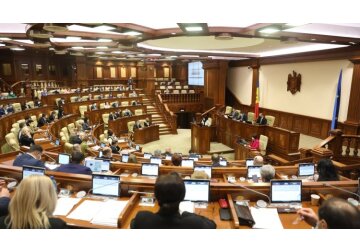
Moldovan Parliament approved in first reading draft amendments to the Law on National Bank and the Law on Foreign Exchange Regulation.
The draft law envisages a series of amendments aimed at increasing responsibility and discipline of currency exchange institutions, ensuring security of currency exchange, improving quality of services in the field and guaranteeing rights of customers of currency exchange. According to the draft, foreign exchange institutions will have to register each currency exchange operation in cash with individuals at the time of its implementation in the forms of documents established by the National Bank. At the same time, the registration of such operations should not allow differences between the amount of registered transactions and balances of circulating funds for currency exchange operations in cash with individuals, kept in foreign exchange offices (FXO). In accordance with the recommendations of Moneyval (Council of Europe) and in order to comply with legislation on preventing and combating money laundering and terrorist financing, FXO will be required to report data on shareholders and beneficiaries. In particular, when submitting an application for a license to the NBM, it will be necessary to indicate, among other data, the names of the participants/shareholders and beneficiary owners of the FXO, their IDNO/IDNPs, as well as the size and share of the share capital. Shareholders and beneficial owners will be required to confirm the absence of a criminal record and submit a declaration that the beneficiaries of the FXO are not in the process of liquidation or insolvency (legal entities) and have no legal restrictions on the establishment of enterprises or participation in the share capital (individuals). The term of decision-making by the National Bank on the licensing of exchange bureaus and hotels will be increased from 15 to 30 days. There will also be supplemented the general provisions on the conditions of foreign exchange institutions’ activity. In addition to existing requirements, FXO will be required to install video surveillance systems, as well as to keep and store video recordings of the currency exchange activities for at least 15 calendar days. FXO are expected to provide real-time video recording from cameras, at each window, where the currency exchange is carried out. Video footage from the cameras may be requested by the currency control authorities and during the breakdown or malfunction of the video surveillance system the FXO will not be able to operate. Some provisions of the bill are of technical nature, including the notification of the currency exchange procedures for loans and credits - this is necessary for the formation of statistics by the NBM. The bill also provides for an increase from 25 thousand to 100 thousand lei in the maximum amount of fines, which the National Bank may levy from foreign exchange institutions. Thus, it is provided that the National Bank will be able to make a decision on imposing a fine on FXO within 30 working days from the date of the violation detection. The draft law is to take effect five months after its publication. Until then, the regulations for the implementation of the draft law are to be prepared. // 14.04.2022 – InfoMarket







